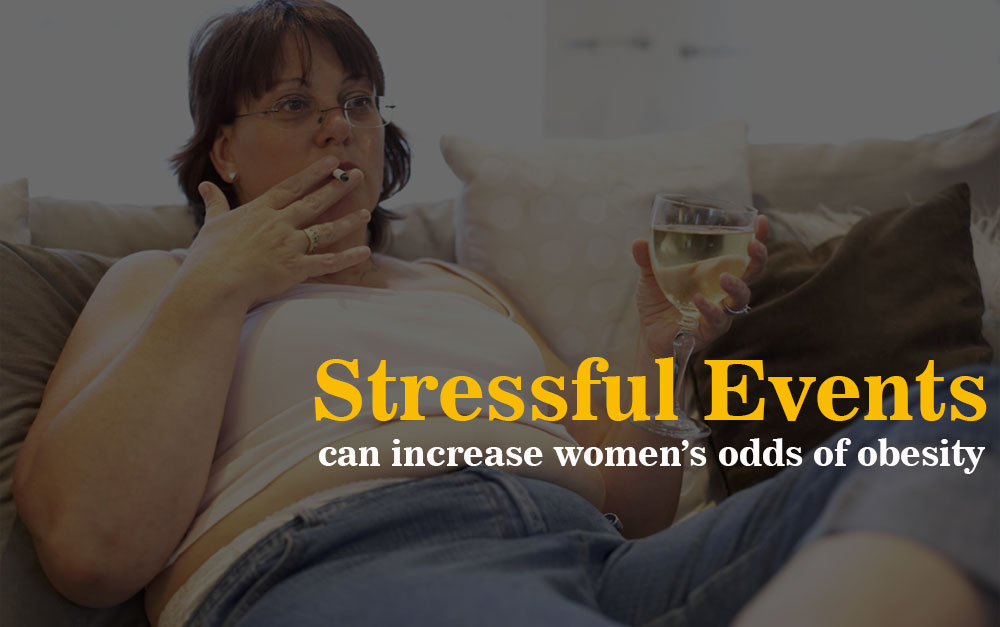Women who experienced one or more traumatic lifetime events or several negative events in recent years had higher odds of being obese than women who didn’t report such stress, according to preliminary research presented at the American Heart Association’s Scientific Sessions 2017, a premier global exchange of the latest advances in cardiovascular science for researchers and clinicians.
“Little is known about how negative and traumatic life events affect obesity in women. We know that stress affects behaviour, including whether people under- or overeat, as well as neuro-hormonal activity by in part increasing cortisol production, which is related to weight gain,” said study senior author Michelle A. Albert, M.D., M.P.H., professor of medicine, cardiology, and founding director of the Center for the Study of Adversity and Cardiovascular Disease, at University of California, San Francisco.
Obesity, a preventable risk factor for cardiovascular and other diseases, impacts more than one-third of U.S. adults. According to the American Heart Association, nearly 70 percent of American adults are either overweight or obese. Women tend to live longer than men, putting especially obese, aging women at greater risk for disease, said study author Eva M. Durazo, Ph.D., a post-doctoral scholar at the NURTURE Center, Division of Cardiology, and UCSF said.
The researchers studied the relationship between major life events and obesity in a group of 21,904 middle-aged and older women, focusing on women with the highest obesity prevalence. They defined obesity as having a body mass index (BMI) of 30 kg/m2 or higher. And, they measured the impacts of two types of stress: traumatic events, which could occur anytime in a woman’s life and includes events as death of a child or being a victim of a serious physical attack, as well as negative life events that had occurred in the previous five years of a woman’s life. Negative events included wanting employment but being unemployed for longer than three months or being burglarized.
Sleep deprivation may increase risk of cardiovascular disease in older women Older women who don’t get enough sleep were more likely to have poor cardiovascular health, according to preliminary research presented at the American Heart Association’s Scientific Sessions 2017. In the new study researchers considered sleeping at least two hours more during the weekend than on the weekday as a sign of being in state debt. Among the roughly 21,500 female health professionals between ages of 60 and 84 the research team followed, women who were in sleep debt were more likely to be obese and have hypertension. When taking into account socioeconomic status and sources of stress, such as negative life events and work-related stress that could also influence cardiovascular health, quality of sleep was still an important factor for good overall cardiovascular health. The results suggest that not getting enough sleep during the week might throw the body off and may increase risk of cardiovascular disease in older women.
NEARLY A QUARTER (23 PERCENT) OF THE WOMEN STUDIED WERE OBESE
Women who reported greater than one traumatic life event versus no traumatic life events had 11 percent increased odds of obesity;
The higher the number of negative life events reported by women in the last five years, the higher the tendency for increased odds of obesity. Specifically, women who reported four or more negative life events had a 36 percent higher risk of obesity, compared to women who reported no such events;
Among women who had higher levels of physical activity, there was a stronger association between increasing cumulative/chronic stress and obesity, though the reason for this finding remains uncertain.
“Our findings suggest that psychological stress in the form of negative and traumatic life events might represent an important risk factor for weight changes and, therefore, we should consider including assessment and treatment of psychosocial stress in approaches to weight management,” Albert said.
Because the study looks at the association between stressful events and obesity in a snapshot of time, future studies should look at the relationship longitudinally, following people for weight gain over time after life events have occurred, according to Albert.
“This is important work because women are living longer and are more at risk for chronic illnesses, such as cardiovascular disease. The potential public health impact is large, as obesity is related to increased risks of heart attack, stroke, diabetes and cancer, and contributes to spiraling healthcare costs,” Albert said.
Want to write for InnoHEALTH? send us your article at magazine@innovatiocuris.com
Read all the issues of InnoHEALTH magazine:
InnoHEALTH Volume 1 Issue 1 (July to September 2016) – https://goo.gl/iWAwN2
InnoHEALTH Volume 1 Issue 2 (October to December 2016) – https://goo.gl/4GGMJz
InnoHEALTH Volume 2 Issue 1 (January to March 2017) – https://goo.gl/DEyKnw
InnoHEALTH Volume 2 Issue 2 (April to June 2017) – https://goo.gl/Nv3eev
InnoHEALTH Volume 2 Issue 3 (July to September 2017) – https://goo.gl/MCVjd6
InnoHEALTH Volume 2 Issue 4 (October to December 2017) – http://amzn.to/2B2UMLw
InnoHEALTH Volume 3 Issue 1 (January to March 2018) – https://goo.gl/fksdQx
Connect with InnovatioCuris on:
Facebook: https://www.facebook.com/innovatiocuris
Twitter: https://twitter.com/innovatiocuris
LinkedIn: https://www.linkedin.com/groups/7043791
Stay updated about IC, visit: www.innovatiocuris.com

